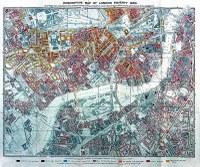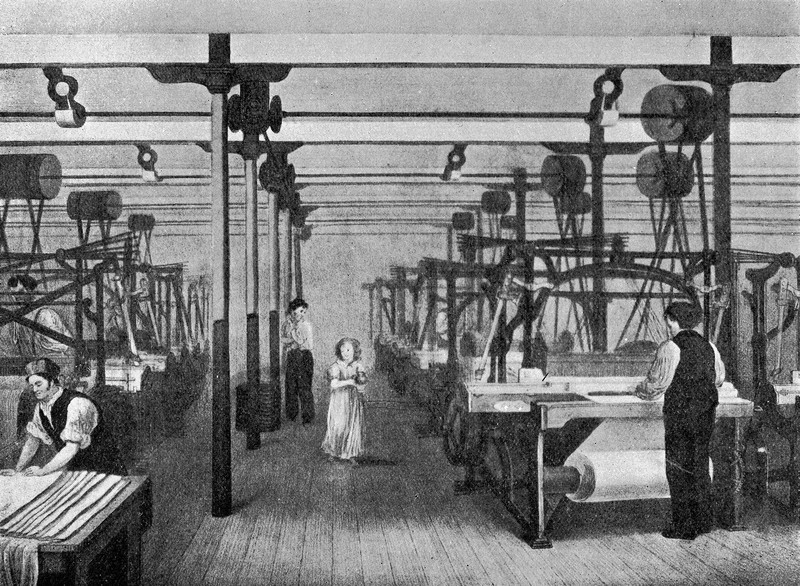MPhil in Economic and Social History

Charles Booth, Life and labour of the people. Credit: Wellcome Collection
Overview
Economic and social history has always formed an important part of the teaching and research in the Cambridge History Faculty, which is widely regarded as one of the best in the world. Much pioneering work in the ‘new’ social history of communities, demographic history, business history and the history of economic thought has been done here. The MPhil in Economic and Social History provides an extremely thorough training in statistical and social science methodology, while building on other strengths such as an emphasis on researching economic relations and institutions as cultural phenomena.
There are approximately 20 members of academic staff associated with the MPhil, ranging in specialisation from early modern economic history to modern Asian history. The course teachers are also associated with two major research institutions: the Cambridge Group for the History of Population and Social Structure and the Centre for History and Economics.
Past and current topics for dissertations include: ‘The Evolution of Ownership and Control in British IPOs before WWI’; ‘Consumer protection in Britain from austerity to affluence, 1945-65’; ‘Plague of Poverty: The World Health Organization, Tuberculosis, and International Development c.1945-1980’; ‘Encouraging Emigration: An analysis of the Estado Novo regime’s approach to emigration in the early 1960s in Portugal’.
In addition to the course seminars there are also 16 faculty research seminars and around 320 other graduate students doing MPhils and PhDs. Combined with the excellent resources found in the University library, this provides one of the most vibrant historical research cultures in the world.
At a glance
All students will submit a thesis of 15,000–20,000 words, worth 70 per cent toward the final degree.
Students also produce three 3,000–4,000-word essays, two in Michaelmas term and another in Lent term; each essay is worth 10% of the final degree grade.
All students admitted to the MPhil in Economic and Social History will be assigned a supervisor to work with them throughout the course, but crucially on the dissertation. Students will meet regularly with their supervisor for one-on-one supervisions throughout the course.
Students can expect to receive:
- regular oral feedback from their supervisor, as well as termly online feedback reports;
- written feedback on essays and assessments and an opportunity to present their work;
- oral feedback from peers during graduate workshops and seminars;
- written and oral feedback on dissertation proposal essay to be discussed with their supervisor; and
- formal written feedback from two examiners after examination of a dissertation.
If you have any questions, drop us a line on ecsoc@hist.cam.ac.uk

The Course
The course is composed of two formally assessed parts, as well as a number of ancillary non-assessed components designed to help students integrate into the Cambridge research environment.
Introduction to Research Seminars
These three classes in Michaelmas term are designed to introduce students to an essential part of academic research – attending, engaging critically with, and presenting research at seminars. As well as helping new postgraduate students to get the most out of attending seminars, these classes provide training in four main areas: the evaluation of research methods; the critique of historians’ arguments; presentation skills; and the examination – broadly and comparatively – of what economic and social historians do.
Core Course: Central Concepts in Economic and Social History
This course consists of a series of seminars/classes in two main areas:
- Economic theory and economic history
- Social theory and social history
Social Science Research Methods Course
These are a set of research training courses in the social sciences organised on an interdepartmental basis. They provide research students with a broad range of quantitative and qualitative research methods skills that are relevant across the social sciences. The programme offered by the SSRMC consists of a series of core modules and open access seminars. The core modules are grouped in three categories: Foundations in Statistics, Advanced Statistics, and Qualitative Methods. They focus on giving students basic IT skills and introducing them to statistical, quantitative and qualitative research design, providing the foundations for a research career in the social sciences.
Students doing the MPhil in Economic and Social History must take a number of SSRMC options, to be published at the beginning of the year, and may choose to take additional modules.
Students are advised to check with their supervisors whether it would be advisable to attend other modules within The Social Science Research Methods Course relevant to their research, and they are encouraged to take as many modules as they wish beyond those required for the MPhil.
The MPhil in Economic and Social History combines taught and research elements over a 11-month full-time programme. The outline in this section is illustrative of a typical course.
Core Course: Central Concepts in Economic and Social History
- Two-hour seminar per week over eight weeks
- Assessment: 3–4,000 word essay (10% of the overall mark)
Social Sciences Research Methods Course
- Assigned modules; pass/fail by attendance and completion of assessments
- Usually one option per term
Option 1
- Two-hour weekly discussion seminars over eight weeks; attendance is compulsory
- Assessment: 3–4,000 word essay (10% of the overall mark)
Preparatory dissertation work
Other options
- At the discretion of the MPhil Director and Course Convener, students may be able to take options from the Faculty's other MPhil courses in place of an option on their home MPhil, or they may be able to audit additional classes.
Applying to the course
To apply to the MPhil in Economic and Social History, you will need to consult the relevant pages on the Postgraduate Admissions website (click below).
Since applications are considered on a rolling basis, you are strongly advised to apply as early in the cycle as possible.
On the Postgraduate Admissions website, you will find an overview of the course structure and requirements, a funding calculator and a link to the online Applicant Portal. Your application will need to include two academic references, a transcript, a CV/ resume, evidence of competence in English, a personal development questionnaire, two samples of work and a research proposal.
Research proposals are 600–1,000 words in length and should include the following: a simple and descriptive title for the proposed research; a rationale for the research; a brief historiographic context; and an indication of the sources likely to be used. The document should be entitled ‘Statement of Intended Research’. Applicants are encouraged to nominate a preferred supervisor, and are invited to contact members of the Faculty in advance of submitting their application to discuss their project (see our Academic Directory: https://www.hist.cam.ac.uk/directory/academic-staff).
Below are some anonymised examples of research proposals, submitted by successful applicants to the MPhil in Economic and Social History. You may use these to inform the structure of your submission. Please note that they are purely for guidance and not a strict representation of what is required.
Economic and Social History - Research Proposal 1
Economic and Social History - Research Proposal 2
Economic and Social History - Research Proposal 3
Assessment & Dissertation
Part I
Each of three modules in Michaelmas and Lent (one Compulsory Core, and two Options) will require a 3,000-4,000 words essay (or equivalent), which may be under timed conditions.
Each will count toward 10% of the final degree mark, for a total of 30%. Taken together, these are Part I, and students must receive passing marks in order to move to Part II.
Students will also prepare a 4,000-word dissertation proposal essay due early in the Easter Term. This is assessed on a Pass/Fail basis but where a student fails the essay it must be compensated with a mark of at least 63% in the dissertation. Students will meet with their Supervisor to discuss the essay and get feedback in preparation for the dissertation.
Part II
The thesis is Part II of the MPhil in Economic and Social History.
All students will submit a thesis of 15,000-20,000 words in mid-August, worth 70% of the overall mark.
At the discretion of the Examiners the examination may include an oral examination on the thesis and on the general field of knowledge within which it falls.
Practical assessment
All students will present their work at least once during the academic year and will receive feedback from academics and peers on their work-in-progress. This is not an assessed element of the course but is a valuable feedback tool for the dissertation.
Students are also required to pass the Social Sciences Research Methods courses, and may be required to take a practical assessment as part of these courses.
The formation and execution of the dissertation project on a subject in economic and/or social history is the largest and most important part of the student’s work in the MPhil in Economic and Social History. It is expected that it accounts for approximately 60 percent of the student’s time over the eleven months of the course.
Candidates are required to design, research and write up a dissertation on a subject in the fields of economic and/or social history that has been approved by the Faculty of History. The dissertation must be between 15,000 and 20,000 words in length, inclusive of tables and appendices, and exclusive of footnotes and bibliography.
Candidates must demonstrate that they can present a coherent historical argument based upon a secure knowledge and understanding of primary sources and they will be expected to place their research findings within the existing historiography of the field within which their subject lies. The dissertation must represent a contribution to knowledge, considering what may be reasonably expected of a capable and diligent student after eleven months of MPhil level study.



